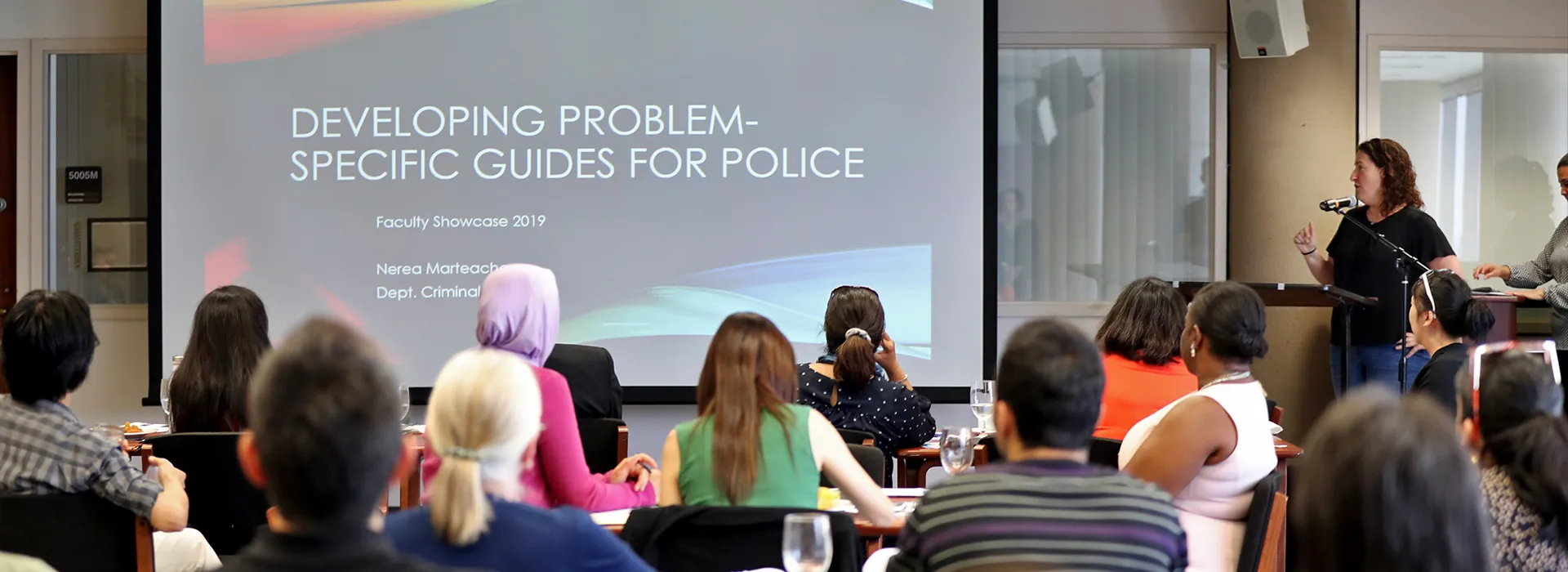Joe Gutierrez Office of Strategic Communication (909) 537-5007 joeg@csusb.edu

The annual Spring 2019 Faculty Showcase at Cal State San Bernardino celebrated 11 faculty members and their success in using innovative pedagogies and learning technologies for instruction. “Today we recognize those who have used their creative ability to develop and implement innovation into their teaching as well as those using institutional research data to not only inform, but to discover ways to improve student success as part of the GI 2025 initiative,” said CSUSB President Tomás D. Morales in his opening remarks. “Teaching is an art and requires time and thoughtful attention to help it develop and flourish.” “The spring showcase is more than a celebration of hard work,” said Mihaela Popescu, professor of communication studies and faculty director of CSUSB’s Academic Technologies & Innovation, in her opening speech. “It is also an acknowledgement of community and the many ways in which the campus supports it.” The 11 faculty members presented their projects in a five-minute, Ignite-style format. The participants were:
- Cheryl Brandt, nursing
Brandt developed a virtual reality simulation in her Intermediate Nursing Process, Roles & Skills class in order to teach nursing students how to educate patients for chronic disease self-management.
- Bibiana Diaz, world languages & literatures
Diaz used a 360-degree video in her La Construcción y representación de las identidades chicanas en el Arte y la Cultura class to bring to life for her students a 3D virtual tour of several locations in the greater San Diego area rich in Chicano history and art.
- Hideya Koshino, psychology
Koshino investigated ways to measure the benefits of mindful meditation training in relation to academic performance, personality characteristics and social traits of students.
- Oraib Mango, world languages & literatures
Mango integrated Flipgrid, a video discussion platform, in her College Arabic I and II classes, so that all students could practice their Arabic in conversations.
- Nerea Marteache, criminal justice
In her Environmental Crime Prevention course, Marteache incorporated community-based learning and collaborative research projects that allowed her students to prepare problem-specific guides on relevant issues for the local law enforcement.
- Ahlam Muhtaseb, communication studies
In her Public Relations Principles class and Settler Colonialism and Palestinian Cinema class, Muhtaseb used Zoom and the principles of connected learning to establish connections between her students, activists and professionals from around the world, including Oscar-winning director Hani Abu As’ad, whose work the students studied in class.
- Jeremy Murray, history
In his World Civilizations II: Civilizations East and West class, Murray implemented a series of qualitative assignments that evaluated critical reading, critical thinking and university-level writing and analysis assignments.
- Peter Robertshaw, anthropology/philosophy
Using a game idea developed with Frances Berdan, professor emerita, Robertshaw oversaw the development of a fully immersive archaeological virtual reality environment that enabled students in the World Civilizations 1 class to practice their archaeological skills and experience the excitement of discovering sites.
- Karen Robinson, sociology
Robinson, who is a Faculty Data Fellow, investigated the variations in the retention of four-year graduate rates of first-time freshmen across college divisions.
- Scott Vance, music
Vance taught his students about the sonic relationships found within the virtual reality environment while working with them in his class Topics in Music Technology to produce sound assets for the virtual reality archaeological simulation Ambrosia.
- Caroline Vickers, English
Vickers, a Faculty Data Fellow, collected data on native English speaking and non-native English speaking first-year freshmen starting in fall 2013, and tracked their progress through up to quarter 12 in order to understand the relationship between student use of multiple languages and their performance in the first-year composition course. The work of the Faculty Data Fellows was also recognized during the event. The Faculty Data Fellows program seeks to mine the data available from Institutional Research to identify campus-wide or college-specific challenges to student graduation and make concrete recommendations for action and improvement. The Spring 2019 Faculty Showcase was cosponsored by Academic Technologies & Innovation, Institutional Research, Teaching Resource Center, and the John M. Pfau Library.